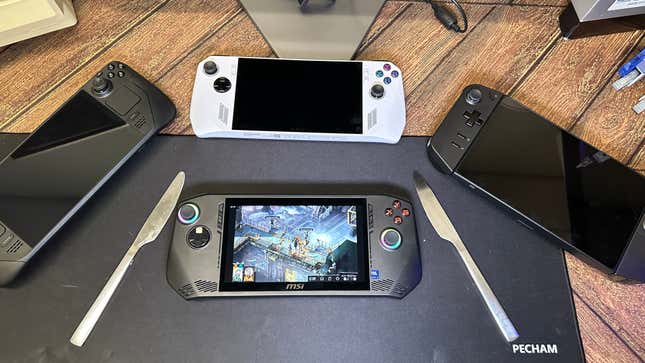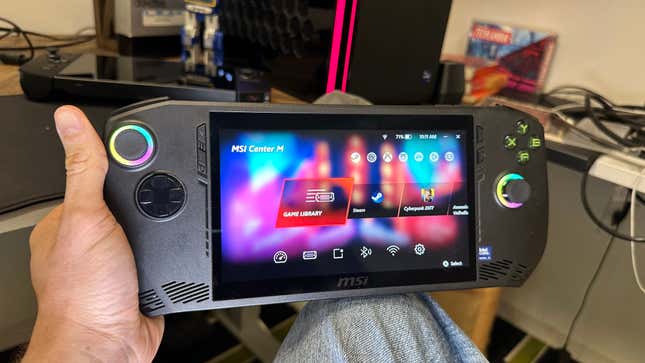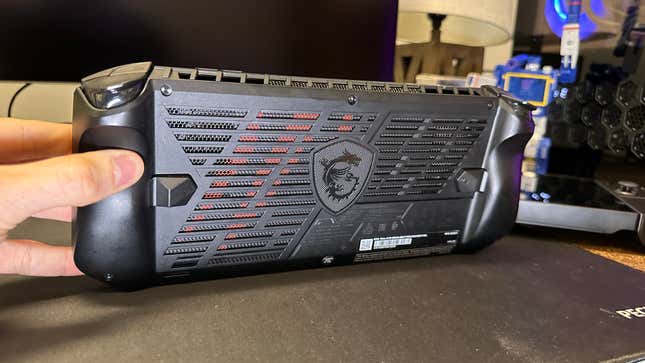MSI Claw A1M
The MSI Claw cannot compete with the opposite main handhelds available on the market, even with important efficiency updates.
The MSI Claw is simply too costly for this sort of efficiency, and the half-baked software program does little to masks the problems current with Home windows on a handheld. Except you discover the Claw with a heavy low cost for lower than you may get different gaming handhelds, it is best to attend till the sequel Claw comes out later this 12 months.
Beginning at $750 for the Intel Core Extremely 7 mannequin (Reviewed at $800 for the 1 TB model)
Professionals
RGB Lighting within the face buttons
Newest updates and Overboost drastically improve total efficiency
Cons
Middle M software program is obtuse and annoying
Battery life is middling at finest
It prices too rattling a lot for what you get
The MSI Claw A1M didn’t have to do a lot to be a contender within the nonetheless nascent gaming handheld PC house. If MSI had crafted the price range choice, the lower-end machine with fewer bells and whistles than its opponents, it could be a stable purchase. Sadly for everybody concerned, MSI made one of many dearer renditions of the present Linux- or Home windows-based gaming handhelds, and but it one way or the other seems like the most affordable and least thought-out of what’s launched to date.
Even MSI appears to have acknowledged it missed the mark, and now it has a brand new, up to date console popping out someday quickly. In my expertise, efficiency was honest. All of which appears to scream: don’t purchase this console—or on the very least don’t not with out some form of hefty low cost.
The 2 variations of the Claw that price greater than $700 are packing an Intel Core Extremely 7-155H chip. Over the previous few months, I’ve had a substantial amount of expertise with the Extremely 7 cellular chip, and I believed I had a greater concept of how it could carry out in a handheld. MSI promised that after the most recent updates, the Claw ought to be getting higher efficiency than the ROG Ally in a number of totally different titles, ostensibly sufficient to justify its increased price.
However nothing does. MSI Claw has RGB lighting in each the thumbsticks and the buttons, and it appears good. Does it drain the battery? Sure, technically, nevertheless it’s there for these of us who need it. That’s fairly actually the one factor I might say the Claw has that different main gaming handhelds don’t.
The large query is how low in value the MSI Claw must go earlier than it’s value selecting up. The $700 Lenovo Legion Go (with 1 TB of storage) and $650 ROG Ally with the AMD Ryzen Z1 Excessive (max 512 GB of storage) are much better buys. The MSI Claw must drop prestigiously earlier than I’d contemplate it an actual choice. Then there’s the Steam Deck OLED, which is my present console of selection. You may seize the 1 TB model for $650 MSRP. The much less highly effective Claw with an Intel Core Extremely 5 chip is a mind-boggling $700 MSRP, and I’ve a sense it received’t match the efficiency of the opposite main manufacturers.
Maybe there’ll be a reduction as soon as MSI releases its new console. You heard that proper. MSI says it’s already engaged on an 8-inch semi-sequel known as the MSI Claw 8 AI. The corporate stated in a release that it “listened to consumer suggestions, “ so the brand new console is meant to have one of many upcoming, extra highly effective Intel Lunar Lake processors. The brand new console may have a battery and Thunderbolt 4 assist, and the fitting and left bumpers ought to be modified so that they really feel much less spongey. As well as, MSI’s director of product administration, Clifford Chun, mentioned earlier this month they’re additionally engaged on a brand new 7-inch model.
If the Claw 8 additionally manages to match the battery and efficiency of the ROG Ally X, fixes up the management points, and updates the software program with out adjusting the value, possibly it will likely be a contender.
For all its promise, the primary Claw just isn’t, and sure by no means can be.
MSI Claw Design and Software program
Every little thing Wants a Heavy Facelift Three Months After Launch
The MSI Claw appears a lot like a ROG Ally that it’s uncanny. There are solely delicate variations, however they drastically have an effect on total consolation. The face buttons and d-pad are simply effective, possibly even a little bit extra pronounced than the Ally or the Legion Go, however the thumb sticks get the worst of it. I didn’t just like the tiny, toothpick-thin really feel of the sticks on the Legion Go or the Ally, and these aren’t any higher. They’re Corridor Impact joysticks that ought to make them final for a very long time, however they’ve so little resistance and lack the tactile really feel I demand for such an costly machine.
The triggers are effective, however the bumper buttons are a few of the worst I’ve used on a contemporary controller. They really feel spongey and solely collapse towards the sides slightly than press down uniformly. The 2 again bumpers have sufficient click on to them, however the way in which the rear shell was designed makes it tough to succeed in behind to press them.
The Claw doesn’t actually really feel prefer it’s meant for an grownup’s palms. I’d think about some alien creature whose lead fingers are twice so long as their pinkies (possibly that’s why it’s named “The Claw”). My fingers naturally need to curl round some a part of the rear chassis, nevertheless it’s so jagged and un-ergonomic that I may by no means get a cushty grip. A big fan grate part runs alongside the again of the shell, and inevitably, your fingers will dance upon one groove or one other. Sure, the information of your fingers do begin to really feel barely hotter than the remainder of your hand throughout an extended gaming session.
That is one other Home windows handheld machine, and with that comes all the luggage of an OS made for greater screens. Microsoft’s refusal to release a version of their OS particular to handhelds has compelled OEMs to give you their very own answer. Just like the Ally and Legion Go, the Claw comes with device-specific software program to make it a bit simpler to tug up your video games. MSI’s is named Middle M. Out of all of these I’ve used, like Asus’ Armoury Crate SE and Legion House, Middle M is the worst. It’s barebones, with a clunky interface and an excessively easy sport choice menu. There’s just one choice for real-time FPS monitoring that doesn’t show CPU or GPU utilization. The software program is laggy when biking by way of menus and freezes up greater than as soon as throughout use.
Too many different hiccups disrupt your gaming expertise on the Claw. I’ve needed to restart the Claw a number of instances once I encountered unresponsive video games that ignored each my contact and controller inputs. At a sure level, the hand held stopped recognizing the quantity buttons, after which I spotted it had randomly switched off the controller to PC controls for no rhyme or purpose. If I put it into sleep mode, generally the RGB stays on, blinking inexorably like a dying man whose gentle is leaving their eyes.
MSI Claw Efficiency
‘Overboost’ Does Imply Higher Efficiency, But it surely Doesn’t Repair All of the Flaws

Benchmarking the MSI Claw is a chore. You get the everyday energy settings with most different handhelds, however the newest replace launched the “Overboost” setting that’s presupposed to tip the scales in MSI’s favor. In our expertise, it provides higher efficiency, however provided that you’re prepared to push the Claw to its limits. And nonetheless, with the settings of every competing console taken under consideration, the MSI Claw didn’t essentially carry out so a lot better on all of the video games we examined.
The Claw’s bigger 53W battery ought to be providing a greater spin on totally different titles with the power to high as much as a acknowledged 40 W TDP. I didn’t expertise any main distinction in efficiency benchmarks on 40 W TDP than 30W in a sport like Cyberpunk 2077. Overboost, in impact, presents you an actual 35-40 W TDP. The remaining is a smokescreen.
Due to the Claw’s Intel chip, it doesn’t have entry to AMD FSR. It means there’s an even bigger gulf in efficiency for many video games. Some latest titles, like Murderer’s Creed: Valhalla, lack any assist for Intel’s XeSS.
The Steam Deck is the outlier amongst different handhelds. Whether or not it’s the OLED or LCD model, it maxes out at 15W. The Claw doesn’t even go that low. The Deck, which is particularly optimized for a sport like Cyberpunk 2077, will hit 30 FPS frequently with the usual “Steam Deck” settings profile. A Claw at 20 W will solely get 27. Push it as much as 30 W, and it’s higher at 35 FPS, however then it all of the sudden fails compared to the ROG Ally, which might high off at 40 FPS common on the sport’s benchmarks. You get related outcomes with Legion Go in the identical energy and backbone settings.
That is still in keeping with all of the video games we’ve examined with out Overboost. In Forza Horizon 5, the Ally managed to do 60 FPS in benchmark checks in comparison with the Claw’s 42. The Legion Go did 59 FPS, all with the identical settings profile. Decreasing the graphics settings can increase some scores, however let’s be trustworthy: we’re not enjoying on a gaming handheld that calls for 60+ FPS if it comes at the price of muddy visuals with jagged textures.
MSI promised that the Claw would do 26% higher than the Ally on a lot of the high 100 video games on Steam with its overclocking Overboost setting enabled. This wasn’t there in the course of the launch, however now it’s supposed to enhance issues considerably. And you understand what? It undoubtedly does. It really made Murderer’s Creed: Valhalla playable on excessive settings. I noticed boosts of between 20 to 30% higher framerates in most video games.
I reran all of the benchmarks and managed to get 41 FPS in Cyberpunk 2077. I went as much as 50 FPS in Forza, however that also pales compared to Ally’s unique benchmark.
Let’s even be clear that I would like an AI upscaler fixing framerates slightly than an overclocking function. As a result of if I can get upwards of fifty FPS on the ROG Ally in Baldur’s Gate 3 with excessive settings and FSR on ultra-performance mode, I’d take that over the sub-30 FPS I get on the MSI Claw enjoying in the identical space even with TDP maxed out and Overboost on as a result of there’s no choice for XeSS. That’s much more necessary when you think about the influence of upper settings on battery life.
MSI Claw Sound, Display, and Battery
Every little thing is Simply Common

Don’t count on the prettiest gaming expertise on a handheld, however the Claw’s visible capabilities are nearly ample for one of these machine. It’s a 7-inch IPS LCD display screen with a 1920×1080 decision and 120 Hz refresh charge with VRR. Visually, I’d say the Claw’s show is equal to the Ally. They appear so related that I may go from one to a different and never miss a beat.
So should you evaluate it to different screens available on the market, it’s simply alright. It received’t beat the OLED of the Steam Deck nor have the power to push the upper resolutions of the bigger, 8-inch display screen on the Legion Go. It’s no slouch, nevertheless it’s simply fairly fundamental.
Sound-wise, the Claw does simply effective. It doesn’t have superb bass, however a handheld this dimension wouldn’t. It doesn’t pack the Dolby Atmos assist of the Ally, however with the way you’re enjoying your titles, it doesn’t make that large of a distinction.
And eventually, by way of longevity, the 53 Whr battery didn’t make for a lot better battery life total in comparison with different Home windows-based friends. Enjoying one thing like Disco Elysium, I obtained about three hours earlier than I wanted to recharge. I performed one thing like Cyberpunk 2077 in below one hour, which is anticipated for any graphically intense sport, particularly while you push the graphics to about what the console may assist. Overboost didn’t have a huge effect on the battery, fortunately. It’s about what I get with different consoles, although the Deck OLED remains to be the winner right here with its 50 Whr battery plus the OLED display screen needing much less juice.
Simply Skip the Claw

As a substitute of rising furious on the efficiency and construct of the MSI Claw, I really feel extra bored by it. It’s not assembly others in efficiency metrics, nevertheless it’s nonetheless playable on most titles. It’s in most methods worse than a Steam Deck OLED by way of really feel and worse than a ROG Ally in efficiency.
It could be a contender if it had been $150 or $200 cheaper than its ludicrous $800 MSRP. As a substitute, it’s an outlier, the plain “oh, however there’s a greater choice” of the present gaming handheld house.
The following model of the Claw, whether or not it’s 7 or 8 inches, must do way over provide a refresh to what’s already damaged. Middle M wants way more TLC than most different handheld software program proper now. Since MSI is sticking with Intel, the corporate wants to verify its handheld is doing as a lot, if no more, efficiency natively than the opposite corporations on the similar value level since it may’t rely as a lot on upscaling. Or higher but, make a handheld that can compete on value much better than now. In any other case, we’ll be doing this similar tune and dance a couple of months from now.
Trending Merchandise

Cooler Master MasterBox Q300L Micro-ATX Tower with Magnetic Design Dust Filter, Transparent Acrylic Side Panel, Adjustable I/O & Fully Ventilated Airflow, Black (MCB-Q300L-KANN-S00)

ASUS TUF Gaming GT301 ZAKU II Edition ATX mid-Tower Compact case with Tempered Glass Side Panel, Honeycomb Front Panel, 120mm Aura Addressable RGB Fan, Headphone Hanger,360mm Radiator, Gundam Edition

ASUS TUF Gaming GT501 Mid-Tower Computer Case for up to EATX Motherboards with USB 3.0 Front Panel Cases GT501/GRY/WITH Handle

be quiet! Pure Base 500DX ATX Mid Tower PC case | ARGB | 3 Pre-Installed Pure Wings 2 Fans | Tempered Glass Window | Black | BGW37

ASUS ROG Strix Helios GX601 White Edition RGB Mid-Tower Computer Case for ATX/EATX Motherboards with tempered glass, aluminum frame, GPU braces, 420mm radiator support and Aura Sync

CORSAIR 7000D AIRFLOW Full-Tower ATX PC Case – High-Airflow Front Panel – Spacious Interior – Easy Cable Management – 3x 140mm AirGuide Fans with PWM Repeater Included – Black









